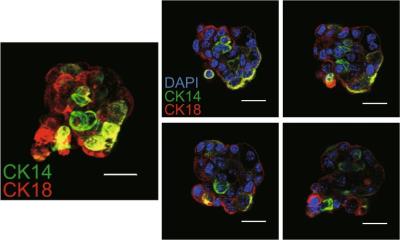Multiple-targeted therapies
The next big thing in advanced breast cancer
The next big development in biological targeted therapies for advanced breast cancer will be drugs acting via multiple mechanisms, experts told delegates attending the 1st Asian Breast Cancer conference, held in New Delhi 9-10 February.
Professor Martine Piccart, Director of Medicine at the Jules Bordet Institute, Belgium, and current President of the European Organisation for Research and Treatment of Cancer (EORTC), told oncologists attending the First Asian Breast Cancer Conference in New Delhi, India this month (February 2008) that several biological therapies directed at more than one target are in development. ‘It is hoped these will add to what has been achieved by agents such as HER2/neu receptor inhibitor trastuzamab (Herceptin) and lapitinib (Tykerb), and the vascular endothelial growth factor (VEGF) blocker bevacizumab (Avastin). New multi-targeted agents, may further improve median survival beyond the currently achievable 2-3 years’.
Sunitinib malate (Sutent), a small molecule oral tyrosine kinase inhibitor, currently approved for treatment of metastatic renal carcinoma and gastrointestinal stromal tumour (GIST), is currently the most advanced in clinical development of around 10 investigational multi-targeted agents for metastatic breast cancer, speakers disclosed. All are active against two or more targets. Others include recentin (AZD2171), AMG 706 and pazopanib.
The principal focus of new agents is against angiogenesis, Professor John Crown, Consultant Medical Oncologist at St Vincent’s University Hospital, Dublin, told delegates; but targeting VEGF alone is not enough. Several drugs act on additional neovascularisation mechanisms . ‘Sunitinib targets all VEGF and platelet-derived growth factors (PDGF), the stem cell receptor KIT and other factors including ,’ he noted. ‘PDGF has a role in stabilising new blood vessels and tumours expressing PDGF and KIT are associated with poor prognosis. KIT is increasingly recognised in triple-negative breast cancers that oncologists scratch their heads over,’ he added. ‘Some of these difficult-to-treat, HER 2 and hormone-receptor-negative patients respond to sunitinib so that’s of great interest.’
Sunitinib has shown proof of concept in preclinical models of advanced breast cancer and has demonstrated activity as a single agent in clinical studies, he remarked. In a phase II clinical study of heavily pre-treated metastatic breast cancer patients, single-agent sunitinib therapy showed an 11 per cent partial response rate. In another study of 22 patients who had failed adjuvant anthracycline-containing regimens, sunitinib combined at a dose of 37.5mg/day with docetaxel (75mg/m2 every three weeks), using a dosing schedule of two weeks on and one week off, showed synergistic activity achieving a 72 per cent partial response rate in 18 evaluable patients treated over 159 cycles. ‘This is clearly a very active combination and it has gone on to further investigation in a larger phase III trial,’ he noted. Toxicity was as expected given the inclusion of docetaxel but was manageable, he added
Current phase III trials are now investigating sunitinib with taxanes or capecitabine in advanced breast cancer both in chemotherapy-naïve and heavily pre-treated patients who have failed multiple chemotherapy regimens. One trial will investigate a combination of paclitaxel and sunitinib against paclitaxel and bevacizumab as first-line therapy. Another is looking at a combination of docetaxel and sunitinib as first line therapy. In previously-treated patients, sunitinib is being investigated in combination with capecitabine in one trial and is being compared as single-agent therapy against capecitabine in another. A further phase II trial is exploring sunitinib as second-line therapy versus standard care in previously-treated triple negative patients.
If sunitinib shows sufficient clinical activity in phase III metastatic breast cancer trials in combination with chemotherapy, one of the next really interesting lines of investigation to be pursued will be to look at it in combination with HER2/neu antagonists, he suggested. Trials are currently still recruiting patients.
Further information can be obtained at www.suntrials.com.
30.04.2008











